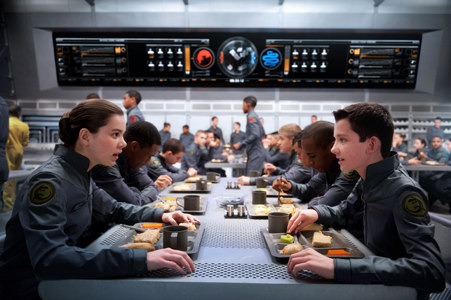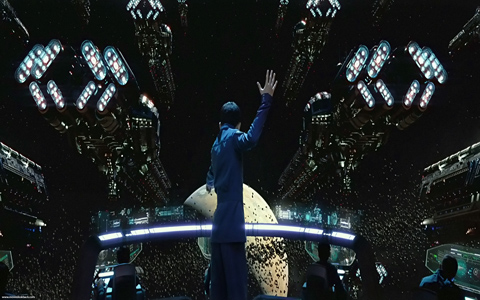It is never entirely fair to compare a movie to the book it is based on. They are two different media that operate in different spheres of perception–one visual, and the other contemplative. Yet “Ender’s Game” is such a well-loved piece of science fiction that it is hard to justify all the changes that were made for the sake of the film. The movie falls victim to the “Phantom Menace” problem: it was dumbed down too much. It is ok to target a young audience with this story–Card’s novel is arguably a book for kids. But you can’t tear the essence of the story out in an attempt to make this friendlier for the kid audience; doing so puts this adaptation on a foundation of sand.
In the near future, a hostile alien race (called the Formics) have attacked Earth. If not for the legendary heroics of International Fleet Commander Mazer Rackham (Ben Kingsley), all would have been lost. In preparation for the next attack, the highly esteemed Colonel Hyrum Graff (Harrison Ford) and the International Military are training only the best young children to find the future Mazer. Ender Wiggin (Asa Butterfield), a shy, but strategically brilliant boy is pulled out of his school to join the elite. Arriving at Battle School, Ender quickly and easily masters increasingly difficult war games, distinguishing himself and winning respect amongst his peers. Ender is soon ordained by Graff as the military’s next great hope, resulting in his promotion to Command School. Once there, he’s trained by Mazer Rackham, himself, to lead his fellow soldiers into an epic battle that will determine the future of Earth and save the human race. Based on the best-selling, award winning novel, ENDER’S GAME is an epic adventure which stars Asa Butterfield, Hailee Steinfeld, Ben Kingsley, Viola Davis, with Abigail Breslin and Harrison Ford. (Synopsis by Summit)
Those that have read the book will immediately realize that director Gavin Hood hits the fast-forward button every time he needs to get to a particular plot beat. At the pace this story movies, there has to be an additional 45 minutes on the cutting room floor somewhere, and it’s debatable whether someone who hasn’t read the book could really even follow the plot. Some of the major cuts are acceptable: the book’s subplot of Ender’s siblings Peter and Valentine plotting against the world is largely excised from the screen version. But the movie goes too far in also removing the two as valuable character development for Ender. There is nothing to establish him as fighting against the internal forces that end up defining his character. Without Peter (evil) and Valentine (good), there is just Ender trying to manufacture the conflict of his actions, and failing to invest the audience in that conflict. Hood tries to write this back into the script by injecting Petra into the role of Valentine. This choice undermines another critical piece of the book’s narrative structure: Ender’s isolation.
So much of the book revolves around Ender’s “necessary” isolation and its inevitable effect on his well-being, and it is surprising that so little of that translated to the script. Almost immediately Ender becomes a well-loved leader of a close knit ‘toon. Minutes after Harrison Ford’s gruff instructor Colonel Graff says Ender must always feel like he’s on the outside, Ender and his team are eating meals together and cozying up to play video games. Petra steps into Valentine’s role and never leaves his side, until he abruptly cuts off the relationship at the end of the film. Even the adults in the film, whose role is to facilitate Ender’s isolation, end up playing up to him and undermining that idea. But why does his isolation matter? Without giving away the twist, when the curtain is finally pulled back at the end, and Ender’s purpose is revealed, the horror he feels rings hollow on the screen. As a character, he alone is supposed to take on the responsibility of what happens. When he is surrounded by people who are close to him, they undermine this character shift and everything from that point on falls flat. His reaction of horror, subsequent redemption arc, and separation from all he knows all cease to make sense when everyone around him is as complicit in the outcome as he is.
The biggest disappointment might be role the adults in the script play. There is a missed opportunity in failing to show the adults as more lost than the children. Especially in Graff, whose film persona never seems out of control or lost. To borrow from another, stronger movie: how much better would have this been if it had been handled “Moonrise Kingdom” style? In that film, the only people who seem to know what they are doing are the kids, while the adults bounce off each situation looking more and more lost. It’s a small change that would have made a world of difference. Instead, “Ender’s Game” chooses to have the supporting cast constantly stating how smart and great Ender is. To explicitly state that instead of proving it–as the book spends chapter upon chapter doing–is lazy writing.
It’s a personal pet peeve to hear an adult talk to a kid like they are stupid. Kids are short, not dumb. You don’t have to dumb everything down for them. This is a generation that celebrated the murder festival that was “The Hunger Games.” That being the case, did “Ender’s Game” need to remove the two deaths Ender causes in the book? Do you have to go out of the way to not mention the battle at the end involves actual soldiers dying at Ender’s command, not drones in a simulation? Do you have to have the characters state each plot point? Kids will figure out what is going on. The jobs of the director and screenwriter are to use the medium to make them understand what they see. Yes, this is harder than having a CGI interaction with a praying mantis while Ender quips about obvious plot points. But you know what? It’d be a better movie. Put a little more effort into it.
All the visuals of the Battle School zero-gravity game are appropriate, because like the angsty tweens in spacesuits who play it, this movie lacked emotional weight of any kind. Hollywood has this terrible idea that child actors can only show emotion via tears which, again, dumbs down the acting talent. Asa Butterfield played a holocaust victim–I think he can display a conflicted range of feelings without tears slowly rolling down his face. It’s a cop-out and it doesn’t play right with an emotionally brutalized character trained to lead humanity’s armies to victory. He’s supposed to be the number one space marine bad ass and…all…he…does…is cry.
Somewhere inside this script was the movie that should have been made. Instead the Hollywood machine wanted a ‘tween franchise and spat out a dumbed down, fairly bland version. Frankly I’m surprised I haven’t seen toy commercials for this yet. The problem came in taking a fairly mature book and editing it down enough to entice a young audience, but also leaving enough of the adult themes in to make it not really work in either category.
“See It/ Rent It/ Skip It”: You should rent it, but you are going to go see it. We’ve been waiting too long for this movie to get made, so enjoy it for what it is. Try to not to yell out “there’s no crying in battle school!”
TWO AND A HALF STARS out of four.
Directed by Gavin Hood
Rated PG-13 for some violence, sci-fi action, and thematic material.
Runtime: 1 hr and 54 mins.





Leave a Reply
You must be logged in to post a comment.